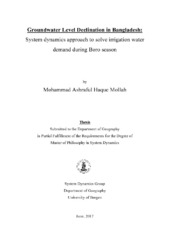Groundwater Level Declination in Bangladesh: System dynamics approach to solve irrigation water demand during Boro season
Master thesis

View/
Date
2017-07-06Metadata
Show full item recordCollections
- Department of Geography [676]
Abstract
Groundwater has been declining in Bangladesh since introduction of deep tube wells (DTWs) and shallow tube wells (STWs) in late 1970s. Seasonal variation of groundwater has been shifted upto 4 meters during last 34 years. During Boro seasons groundwater table dropped drastically than other seasons. This study hypothesized that groundwater extraction is much higher than the natural recharge plus percolated irrigated water. Farmer´s perception is that if they dig deeper the supply would not be a problem, which led uncontrolled use of shallow tube wells (STWs) to extract water from lowered zones. This study selected an area that is 20 km away from Dhaka city having intensive Boro production. Analyzing the interview data (to know about the practices by farmers at present and before) and Bangladesh Water Development Board groundwater table data, we tried to simulate the problematic scenario with the help of simulation software called iThink. To address the problem 3 different policies have been investigated to achieve sustainable solution of the problem. The chosen policies were - (1) Harnessing only groundwater; (2) Alternative cropping; and (3) Depending more to surface water. The simulation results show that alternative cropping and going for surface water could solve the problem as well as able to restore the groundwater to its previous condition. But moving to surface water is a passive solution independent to farmers´ decision. Understanding the problem of groundwater declination by farmers was not so apparent. Farmers never thought of possibility of restoring groundwater table. The study suggested that alternative crop cultivation by replacing Boro rice would be the best sustainable solution not only to halt groundwater declination but also to restore the groundwater table.